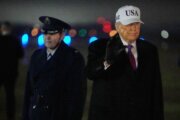The depression, anxiety, sleep problems and other symptoms experienced by former Army Spc. Paul Raines are not uncommon for those returning from war.
Raines, of Frederick, says he suffers from post-traumatic stress disorder related to what he witnessed while serving a tour in Iraq.
“PTSD is an incredibly serious and could be a debilitating illness that initiates from a traumatic event,” said U.S. Air Force Col. Daniel Balog, an assistant professor and assistant chairman of the Department of Psychiatry at the Uniformed Services University of the Health Sciences in Bethesda. “It can manifest itself in a number of ways. It can affect their entire life and family.”
Balog and others who spoke to The Frederick News-Post for this article were speaking generally about PTSD and not about Raines’ specific case.
The most common signs of PTSD are re-experiencing a trauma, avoidance and hyper-vigilance, Balog said.
But no two cases are alike, he said.
“We all have different makeups that impact how we experience these traumatic events,” Balog said. “You have to keep hope. You have to keep fighting and getting the care you need.”
Some are able to cope and show no outward signs, Derrick Hamaoka, a psychiatrist and associate professor at the Uniformed Services University, said.
“We shouldn’t forget that many people are resilient,” he said. “Absolutely, people see a lot of things, experience a lot of things that are potentially very traumatic. They kind of integrate and come through it.”
According to the Defense Department, for the combined operations in Iraq and Afghanistan, a total of 86,625 active-duty service members (not including the National Guard or reserve units) have been diagnosed with PTSD.
Raines served in the Army from 2003 to 2007. His contract with the National Guard runs out in 2013. He is now seeking a medical discharge.
Raines’ problems did not surface immediately after his 2006 return from Iraq. Signs appeared as early as 2008, but it wasn’t until a year later that the depression, unprovoked anger, anxiety, and other symptoms hit the tipping point.
Delayed reactions are not unheard of, the doctors agreed.
“A lot of times you can be primed already and then something happens that is unrelated to the trauma,” Hamaoka said. “That can trigger it.”
More and more veterans will come forward, Balog said.
“People don’t always have a big PTSD sign on their head,” he said. “They have symptoms that they don’t recognize as a disorder.”
Raines has received PTSD treatment at the VA Medical Center in Martinsburg, W.Va., which offers both residential and outpatient services.
Sutton Ulman, the acting program manager for the residential PTSD program at Martinsburg, said his group gets referrals from all across the country.
“The men and women can find their warmth again and hopefully leave behind some things they don’t need to be carrying with them anymore,” Ulman said. “Ultimately, we provide that place for veterans and service members to talk about things so they can put things where they belong.”
The VA center’s 50-bed inpatient program is usually full, he said, and outpatient programs serve several hundred.
Unlike physical injuries sustained in war, PTSD is not always apparent, Ulman said.
“It’s the unthinkable,” he said. “It’s the unspeakable. It’s the thing you wake up to in the middle of the night and the face that you see. That can be shattered by exposure to trauma under combat conditions.”
The military is constantly working with those serving in a war zone to monitor their health — both physically and mentally, Hamaoka said.
Hamaoka and Balog have both been deployed in Iraq and Afghanistan to head combat stress units.
After a deployment, an assessment determines a service member’s well being and extent of exposure, they said.
Programs are available and there is an even an iPhone application — the PTSD Coach app — that can help with learning about and managing symptoms.
If there are signs of PTSD, he most important thing to do is see a doctor .
“If you aren’t taking care of these things, there is a chance of it getting worse,” Hamaoka said.







